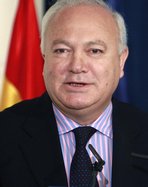European Russophobia and Europe’s Rejection of Peace: A Two-Century Failure
Europe has repeatedly rejected peace with Russia at moments when a negotiated settlement was available, and those rejections have proven profoundly self-defeating. Read more
 Miguel Ángel Moratinos
Miguel Ángel MoratinosAs any Mediterranean citizen, I have followed closely with horror and dread the recent events occurred in our “Mare Nostrum” sea. Unquestionably, we all agree that we cannot carry on as before and wait for the weather to improve and the migratory storm to pass and stop leaving on our coasts thousands of dead and disappeared. I agree with the statement of the EU High Representative Federica Mogherini and the calling of the Italian Prime Minister Renzi for an Extraordinary European Council meeting to deal with the migratory issue. It was about time. Former Italian prime Minister Enrico Letta already proposed this last year, but European leaders and the Commission President José Manuel Durão Barroso preferred to look the other way and put off such a meeting. Now it is no longer possible to put off the urgent adoption of a European migration policy, and the holding of this Extraordinary European Council meeting is very convenient. However, this horror and dread are followed by surprise and dissatisfaction when we see that the measures and the approach put forward by European leaders do not include wider diplomatic measures to eradicate this very serious challenge.
In all statements and announcements made, including the 10 points of the EU action plan approved last Monday by the Foreign Affairs Ministers, only defensive and interior measures are considered. All proposals focus on extending control measures, strengthening surveillance missions, increasing maritime resources, multiplying humanitarian care measures, reinforcing the FRONTEX mission: all of them are necessary measures but, in my opinion, they are wholly insufficient. I have not yet seen diplomatic measures being considered, when it is precisely diplomacy that can mitigate and change this dramatic situation.
This calling for diplomacy is not new. It was already made during the tenure of former President Rodríguez Zapatero. At that time, in 2006 and 2008, our country went through situations very similar to those taking place in Italy now.
The article’s full-text is available on the website of H.E. Mr. Miguel Ángel Moratinos